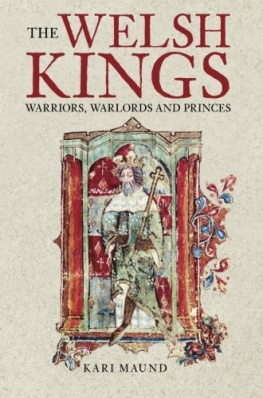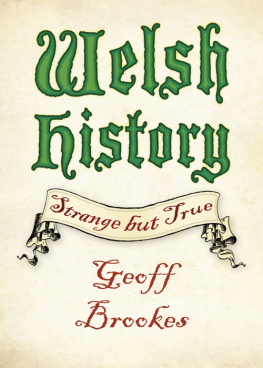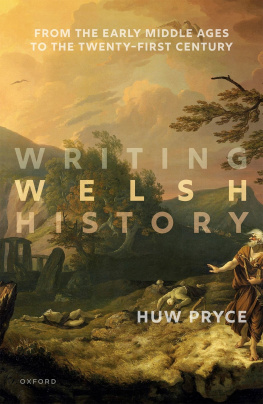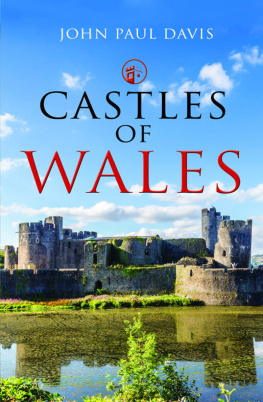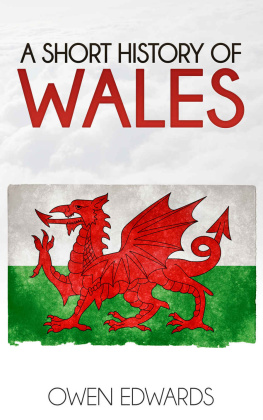Contents
I n writing this book I have received valuable advice, assistance and feedback from colleagues and friends. I should like to thank the National Library of Wales for permission to reproduce the picture of Mascen Wledig from N.L.W. MS 17520A, fo.3; the British Library, for permission to reproduce the picture of Gruffudd ap Llywelyn ap Iorwerth from London, British Library MS Royal 14.C.VII, f.13v; and the British Museum, for permission to reproduce the photograph of the Hywel Dda penny. Thanks are due, too, to Bill Zajac who generously allowed me to make use of photographs from his collection; to James Cooke, who took photographs for me of Cricieth Castle, and to Christine Linton. My mother, Irene Maund, provided me with the line drawings and watercolours, for which I am very grateful. Thanks are also due to my former colleagues, friends, and students in the School of History and Archaeology, Cardiff University, for their support. I am indebted to Professor David Dumville and Professor Simon Keynes, of the Department of Anglo-Saxon, Norse and Celtic, University of Cambridge, for many years of patient advice, assistance and guidance. I also wish to thank Jonathan Reeve of Tempus Publishing. My partner, Phil Nanson, has not only put up with the writing of this book in all its gory details, but accompanied me on many trips to historical sites and assisted patiently in the process of producing maps and genealogical charts: this book is for him.
| ABT | Achau Brenhinoedd a Thywysogyon Cymru. |
| AC (A) | The A-text of the Annales Cambriae. |
| AC (B) | The B-text of the Annales Cambriae. |
| AC (C) | The C-text of the Annales Cambriae. |
| ANS | Anglo-Norman Studies. |
| Arch. Camb. | Archaeologia Cambrensis. |
| ASC | The Anglo-Saxon Chronicle. |
| BBCS | Bulletin of the Board of Celtic Studies. |
| BS | Brenhinedd y Saesson. |
| ByT (Pen. 20) | Brut y Tywysogyon Peniarth MS 20 version. |
| ByT (RB) | Brut y Tywysogyon Red Book of Hergest version. |
| CMCS | Cambridge (Cambrian) Medieval Celtic Studies. |
| ECMW | V.E. Nash-Williams, The Early Christian Monuments of Wales (Cardiff 1950). |
| HB | Historia Britonnum. |
| HE | Bede, Historia Ecclesiastica. |
| HG | The genealogies in London, British Library, MS Harleian 3859. |
| HGK | Historia Grufud vab Kenan. |
| JC 20 | The genealogies in Oxford, Jesus College, MS 20. |
| MG | The genealogies in Aberystwyth, National Library of Wales, Mostyn MS 117. |
| PBA | Proceedings of the British Academy. |
| THSC | Transactions of the Honourable Society of Cymmrodorion. |
| WHR | Welsh History Review. |
W ales in the middle ages is hard to define. At different times its borders varied, sometimes including areas now part of England, sometimes losing areas now considered Welsh, to rulers from Anglo-Saxon or Anglo-Norman England. The shape of the land was to a large extent the product of a long process of invasion, representing the territories retained by the native Britons after the invasion of Britain by the Angles, Saxons, Jutes, and other Germanic peoples in the late Roman and sub-Roman period. Even the words Wales and Welsh are not the products of native speech. They are terms coined by these Germanic neighbours: Anglo-Saxon Wealas and Wealisc, meaning foreigners. In earlier centuries, the Welsh wrote of themselves as Britones, Britons, remembering their origins as the dominant native people of the island of Britain, speaking a common tongue and possessing a common history and cultural heritage. From the seventh century another word, Cymry, from Old Welsh Combrogi, compatriots, came into use, and, from the twelfth century, would become the dominant native term. political entity, and even in periods when much of the country was ruled by a common overking, local and regional identities were strong. Throughout nearly all of the period covered by this book, Wales was made up of a number of separate kingdoms, each with their own royal dynasty, their own administration, and their own identity. The numbers of these kingdoms varied over time, with a tendency for smaller kingdoms to be absorbed into larger, more powerful units as the centuries passed, but unlike England or Scotland, Wales was never to achieve permanent political unity under a single native ruling house.
One result of this was that Wales had a very large number of native kings, princes and rulers: there were something of the order of ninety-seven in the eleventh century alone. Many of these rulers, especially those who lived in earlier centuries, are little more to us now than names, their histories either cloaked in layers of legend and myth, or lost entirely. There are few surviving written historical sources from medieval Wales, and much of what does survive is thin, particularly for the earlier period. These sources are not unbiased or objective, and have been subject to reworking and recasting in the interests of politically dominant families and institutions. As a result, our knowledge of some leaders is filtered through lenses of positive or negative propaganda. Some Welsh leaders impinged noticeably on affairs in England or Ireland, and as a result were recorded in English and Irish chronicles. These sources are valuable, but they are not always favourable to the Welsh, and one cannot now hope to recover details which they may have omitted or misrepresented. There are many questions still open about the characters, actions, and motivations of the men who ruled the kingdoms of Wales between the fall of the Roman Empire and the loss of Welsh independence to Edward I in 1283.
The purpose of this book is to provide an introduction to the kings and princes of the independent Welsh kingdoms. As said above, many of these rulers are now little more than names to us: the book will therefore focus in the main upon those figures whose careers are more fully documented, or who in some way played key roles in the evolution of Wales. It has drawn upon historical, archaeological and literary sources not only from native Wales but also from its neighbours. The period of Welsh independence roughly from the early fifth century down to the end of the thirteenth century was to be one of the most dynamic periods in the history of the British Isles. At its beginning, Britain was part of the wide empire of Rome, subject to a centralised administrative and military structure, and linked by trade, governance, religion and scholarship to much of Western Europe and the Mediterranean. Wales, as such, did not exist as a separate territory: it would come into being as a result of the invasions and colonisation in Britain by the Anglo-Saxons, who drove the Britons out of most of eastern, southern and central Britain into the west (modern Wales and Cornwall) and also the north (into what is now Cumbria and parts of southern Scotland). The development of the Anglo-Saxon kingdoms, and, later on, of a unified kingdom of England, presented new challenges and threats to the kings in Wales, who faced not simply enemies and invaders but also potential allies and opportunities to expand their influence out of Wales back into the wider British arena. The expansion throughout Europe from the later eighth down to the eleventh centuries of the Vikings also was to have its effects in Wales, particularly in south Wales, and was to play a role in reshaping Welsh political life: indeed, at least one king of Gwynedd had Viking blood. In 1066, the Anglo-Saxon kingdom of England was conquered by Duke William of Normandy, and with the arrival of the Normans came a new set of influences on and threats to Wales. The Normans were aggressive and expansionist towards their new neighbours, and would have a dramatic impact upon Welsh political geography. Yet at the same time Norman administrative and governmental practices were adopted and transformed by the native Welsh to their own advantage, allowing some Welsh leaders to strengthen considerably their range of powers and resources, and others to protect and retain their hereditary lands in the face of new legal concepts and officers. The rule over Gwynedd of Llywelyn ap Gruffudd (12461282) was very different in its nature, scope and form than the kingships enjoyed by the leaders who flourished in the fifth and sixth centuries.

